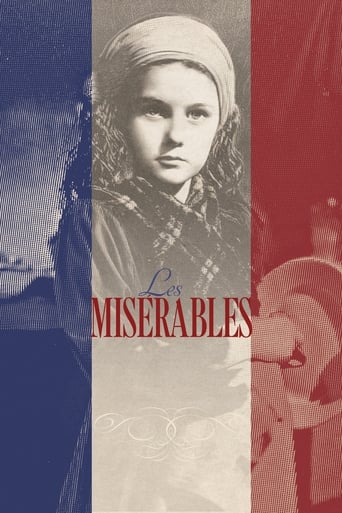sligocait
This is my favorite version of this story, and Michael Rennie is wonderful as Jean Valjean. Robert Newton is also at his crusty best as Javert, his relentless pursuer. I have never seen Rennie give a bad performance and this movie was one of his best, made right as his film career in the US was taking off. The supporting cast is also excellent, and the conflict that arises within Valjean as his feelings of fatherly love for Cosette become romantic feelings that he cannot act upon add to the tension of the film and make for a very complex performance from a gifted actor.I heartily recommend this movie to anyone, and if you are a fan of Michael Rennie and/or of Robert Newton, you won't be disappointed in either of them. ENJOY!!
disdressed12
i liked this version of Victor Hugo's classic novel,Starring Michael Rennie as Jean Valjean and Robert Newton as Javert.however i prefer the 1935 version starring Frederic March as Valjean and Charles Laughton as Javert.this may just be personal preference but i think March and Laughton were more suited for their roles than Rennie and Newton were.i found this version a bit slower,and not quite as compelling,though it still has its moments.the theme of redemption is of course front and centre,but it is not as well developed or explored here,and has less of an impact.the ending though similar to the 1935 version is not as powerful.still,a very good film.for me,Les miserables (1952)is an 8/10
Michael_Elliott
Les miserables (1952) *** (out of 4) Slick production of Victor Hugo's classic novel has Michael Rennie in the role of Jean Valjean and Robert Newton as the Inspector hounding him for decades. This is only the second version of the novel that I've seen (the 1935 being the first) so it's hard for me to compare various versions but it's interesting some of the changes made here. Of course we get small changes like the amount of money owed Valjean after he's released from jail but the final chase through the sewers is changed a bit and some of the overall attitudes towards the two leads are also changed. I think these type of changes always make for an interesting viewing experience when it comes to often filmed stories like this one, Dr. Jekyll and Mr. Hyde and various others. While there's a lot to enjoy here I think the biggest issue is the performance of Rennie. He has proved that he could be great in certain roles but I found here pretty bland here and not the least bit interesting. His performance here will remind plenty of his one in THE DAY THE EARTH STOOD STILL but where that laid back approach worked for that classic, it really hurts this film. I never really bought him in the role and instead of seeing and feeling the character it felt more like I was watching an actor struggle with a part. Newton on the other hand is one I really enjoyed. He played the part with a nice coldness that comes through quite well but he also adds a stern, father-like touch that make the character stand out. Debra Paget, Cameron Mitchell and Elsa Lanchester round out the cast. The music score is an effective one and the cinematography is top-notch. Milestone handles the material quite well and he really makes a beautiful looking film with plenty of style and some really good looking shots. I think it would be fair to say that this is a handsome production but it's missing some of the heart and soul of the earlier version.
MARIO GAUCI
Watchable version of the oft-filmed Victor Hugo tale: made by the same studio (Fox), it emerges as a wholly inferior remake of the superb 1935 version – which I reviewed earlier this month. Despite Milestone’s involvement, this one displays more surface gloss than genuine style – with the script itself being much more prosaic. Still, there’s an intermittent evidence of talent throughout – for instance, in the rather effective final shot which frames the mirror image of the protagonists between the all-important candlesticks; also worth noting is the score by Alex North which, particularly at the climax, feels like a dry run for his Oscar-nominated work on SPARTACUS (1960).Michael Rennie and Robert Newton are fine actors, but their performances here are no match for Fredric March and Charles Laughton in the earlier film; though Newton is remarkably restrained, his role has been somewhat diminished to accommodate the sappy romance involving Debra Paget and Cameron Mitchell! Besides, it’s compromised by the loss of two small but important scenes from the 1935 version which, in this case, robs the character of essential depth: a) when Javert is humiliated by his peers for his lowly background, and b) when he blackmails newly-appointed Mayor Jean Valjean, a former convict, in his office; unbelievably, it substitutes the first by having Javert’s own father serve a prison sentence on the galley to which he’s himself assigned!Other conceptual flaws include: Edmund Gwenn’s pivotal role of the Bishop, which comes off as whimsical alongside Cedric Hardwicke’s haunting turn in the earlier film; Valjean is depicted as an illiterate who receives schooling from the intellectual played by Joseph Wiseman (his Method approach feels out of place in a 19th century French setting!); Javert’s conscience-stricken demise here is, disconcertingly, brought about by his brief conversation with James Robertson Justice (as Valjean’s right-hand man); missing from the narrative, though, is the poignant character of Eponine (whose role gave a plausible melancholia to the romantic angle in the 1935 film).Ultimately, I wouldn’t call the 1952 LES MISERABLES unnecessary, considering that it’s made with undeniable professionalism and the fact that countless other film versions have followed it; perhaps, the late eminent critic Leslie Halliwell summed it best in his claim that it’s “lacking the spark of inspiration”.



